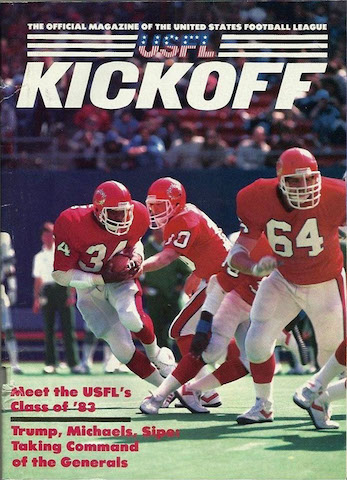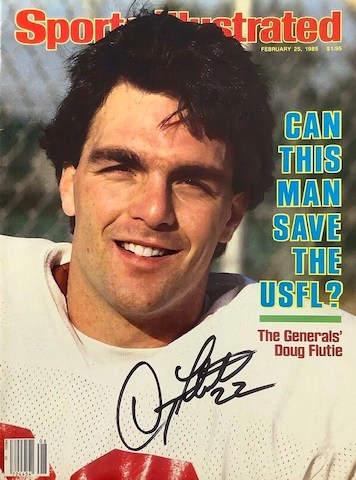
In the years following the AFL-NFL merger, when football supplanted baseball as the nation’s most popular sport, many sports-marketing experts believed that there were enough fans and players to make a rival pro league economically viable. In 1983, the United States Football League took the field in pursuit of this dream.
The USFL plan was to play an 18-game spring football season, with its championship decided in July. The league sought owners with deep pockets, particularly in the Los Angeles and New York markets. The New Jersey Generals franchise was purchased by future US president Donald Trump, but quickly sold to oil magnate J. Walter Duncan. The team would use Giants Stadium as its home field. Recognizing a shortage of quality running backs and passers, Duncan and his GM/Coach, Chuck Fairbanks, signed Heisman Trophy winner Herschel Walker in 1983. The Generals inked quarterback Brian Sipe of the NFL Browns in 1984.
Walker ran roughshod over USFL defenses as a rookie, gaining 1,812 yards. However, New Jersey’s own defense was one of the league’s worst, and the Generals won just 6 games. Duncan sold the team back to Trump at the end of the season. Trump immediately started to rally support among other USFL owners to move their schedule to the fall. Direct competition, he argued, along with a continued investment in marquee players, would force the NFL to merge with the USFL, which would make the league’s owners extremely wealthy.

Trump hired Walt Michaels to coach the Generals in 1984. With Sipe at quarterback and Walker and fullback Maurice Carthon each topping 1,000 yards, the Generals won 14 games, including both meetings with the Philadelphia Stars, the USFL’s best team. A third meeting with Philly in the opening round of the playoffs ended New Jersey’s season, however, as the Generals fell 28–7.
In 1985, the Generals signed their second Heisman Trophy winner, Doug Flutie (left), and traded Sipe before the season. Flutie held his own until a broken collarbone ended his rookie year in Week 15. Walker gained 2,411 yards to win the MVP award and establish a new single-season record for pro football. The Generals went 11–7, but lost to the Stars again in the playoffs.
Following Trump’s lead, the USFL announced that it would forego its spring schedule in 1986 and compete head-to-head that fall with the NFL. During the hiatus, Trump merged his club with the Houston Gamblers, picking up Jim Kelly and coach Jack Pardee, who was charged with blending the talents of Kelly and Walker in a high-powered run-and-shoot offense.
A $1.7 billion antitrust suit brought against the NFL was settled in the USFL’s favor in late July, but the award was a mere $3. The jury found that the NFL was a monopoly, but did not believe the league had conspired to prevent the USFL from obtaining national TV contracts, which was the basis of the lawsuit.
Without the big settlement money—and no TV contract for the fall—the USFL folded its tent and never played a game in 1986.
In 2022, the USFL was revived as a development league for the NFL. Their 13th-round draft pick, former TCU receiver and kick return specialist KaVontae Turpin, won the first USFL MVP Award.